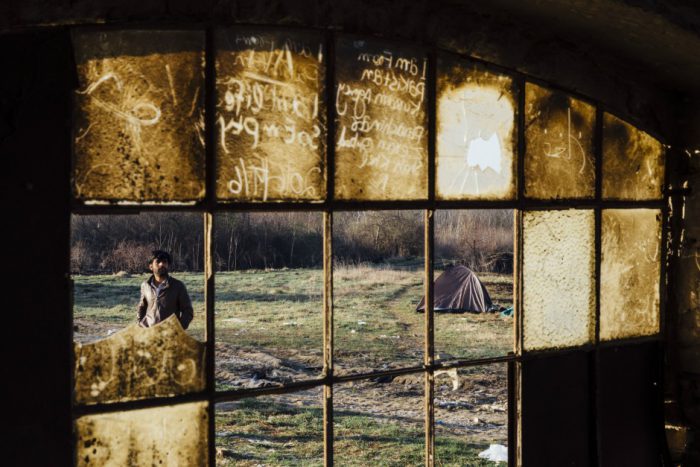Balkan Insight | 24.10.2017
Refugees and migrants taking the long, hazardous journey to the European Union offered unique personal insights into their lives in transit as they made their way across Serbia.
ALI: Syrian father-of-six heading for Hungary
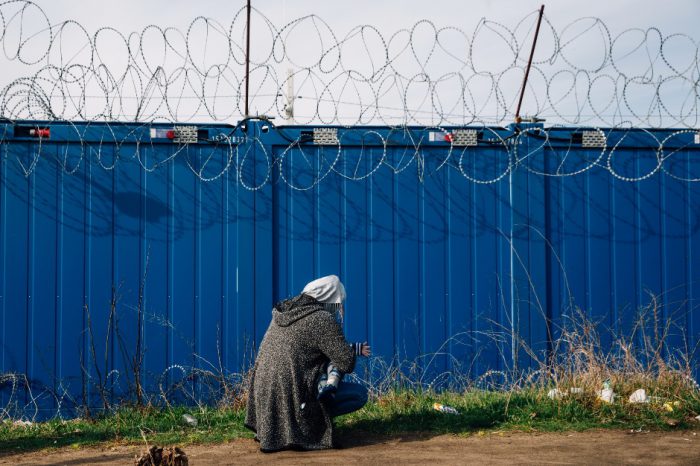
Ali’s wife holds their youngest child and looks towards the barracks of the refugee detention camp. After getting into Hungary, they will have to apply for asylum in the country. Photo: Omar Marques, Krystian Maj/BIRN
After being on the road with his wife and six children for more than a year since they left eastern Syria, Ali was living in the Subotica transit camp in northern Serbia. They had managed to cross the mountains and the sea, but they had got stuck in Serbia because of the closure of the route north.
Ali and his family had applied for asylum in Hungary and after waiting for six months, they were finally selected to cross the border.
However, this did not happen right after the decision was taken; instead they were transferred to the refugee camp in Subotica and waited for around two more weeks until they were able to cross the border.
In March 2017, the Hungarian parliament approved a new law which has been broadly criticised by human rights organisations in Europe and beyond. The law allows for the detention of people who seek asylum in Hungary.
The Hungarian government started to build two shipping container camps surrounded by a barbed wire fence which now house those who request asylum in Hungary.
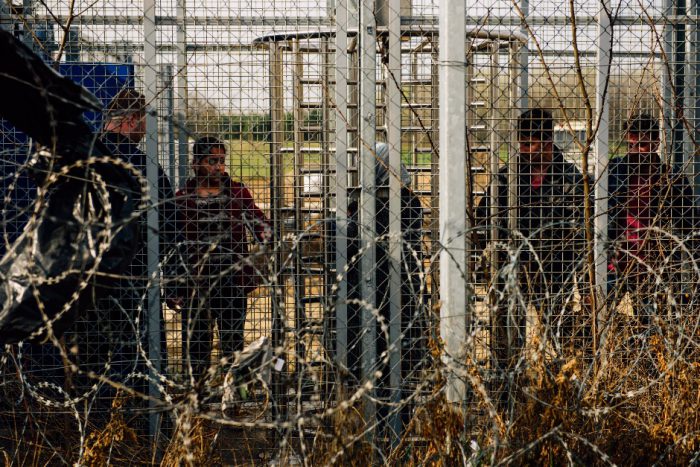
Ali’s family walks through a tightly-controlled tunnel from the border gate to the Hungarian detention camp. A revolving steel door and barbed wire seem more reminiscent of a jail than a sanctuary. Photo: Omar Marques, Krystian Maj/BIRN
One warm morning, after two long weeks of waiting, Ali was informed about the family’s day of departure. They would enter Hungarian territory the next morning.
After lunch, they picked up a taxi to the Kelebija transit point at the border, where they stayed overnight and waited to cross over into Hungary at 8am the following day.
Naser Sherida, Ali’s brother, came with them to say goodbye, hoping that in the near future, he, his pregnant wife and two children will be one of the families selected to cross over to the Hungarian side and be welcomed by his brother. Sadly, the reunion will be inside a detention camp.
Although they did not think about Hungary as a destination when they left, there is a chance there for a normal life here for their children, unlike in Syria.
Ali’s brother Naser hopes they will be able to meet again soon in the detention camp in Hungary.
After living for two years under the ISIS regime, even this perspective does not disillusion him.
„It’s temporary,“ he says hopefully.
He reasons that it’s still a better perspective for the future of his children: „You can’t have a normal life in Syria now. The situation between factions is so tense, I’d be forced to carry a gun and participate in the fighting,“ he says.
MUSTAFA: Iraqi asylum-seeker helps others cross the border
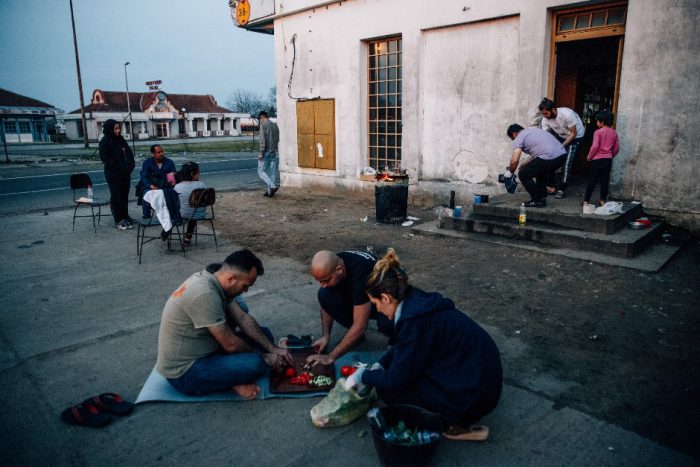
It would be hard to call the Kelebija transit area a refugee camp. It’s an abandoned shop in no-man’s land between Serbia and Hungary, with a few chairs and an old barrel as a fireplace. Photo: Omar Marques, Krystian Maj/BIRN
At the Kelebija border crossing, Mustafa, a young Iraqi asylum-seeker, and his two partners act as an informal bridge of communication between the Serbian Migration Office and the Hungarian authorities.
Every morning, they get a list from the Hungarian authorities with the names of the families or single people that will be allowed to cross the next day.
They carefully prepare a small corner for the new arrivals inside an abandoned building without electricity or water, located 20 metres from the crossing. Food, water and blankets are provided there on a daily basis by the UN refugee agency and the Red Cross.
Today Mustafa, who left the city of Dohuk in Iraqi Kurdistan almost two years ago, gets a lovely surprise. Some of his family, who are living in a camp in northern Serbia, come to Kelebija to enjoy an evening meal with him.
A huge barrel with wood burning inside, a piece of an old grill, three pans, and the outdoor kitchen is ready to operate. The men are the cooks and a spicy, tasty chicken dish with rice and fresh salad is prepared.
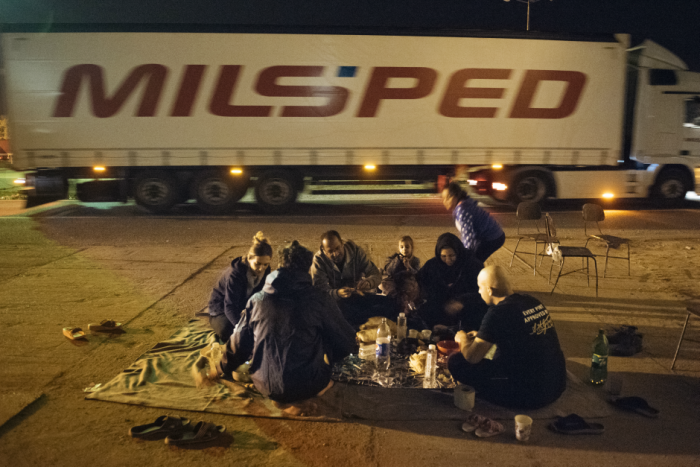
Mustafa’s family gathers on the ground next to the abandoned building to celebrate their reunion over a simple meal. Trucks rush past them, but it does not matter – they are all together and that is what is important. Photo: Omar Marques, Krystian Maj/BIRN
But even with the family environment and the food, their ‘dining room’ continues to reflect their situation.
Trucks passing all the time on the left side, a barbed wire fence on the right side, plus a menacing voice from a loudspeaker shouting in Hungarian. Between the laughs and recollections of memories, sometimes the conversation falters.
Mustafa connects his mobile to the internet and starts playing a video of the Nawroz Kurdish New Year, trying to lighten the mood.
Trying to reach the European ‘promised land’ the legal way may prove to be more painful, depressing and take longer than Ali and Mustafa have imagined.
But there is always an alternative to reach their dream destination.
MUHAMMAD: Pakistani migrant travelling the illegal route
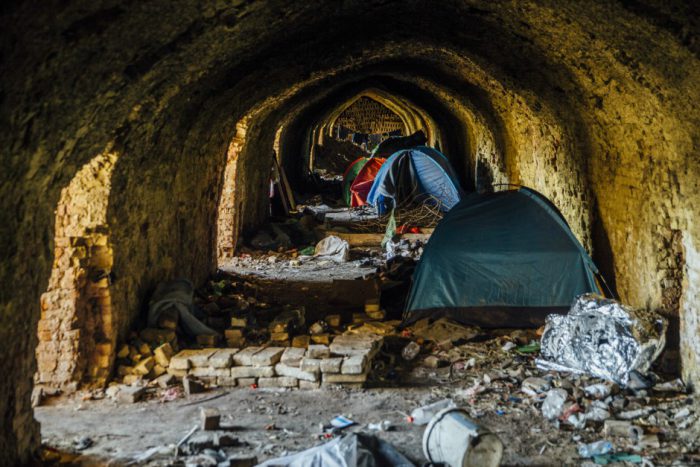
Tents inside the kiln make it a temporary home for the migrants waiting to be smuggled into Hungary. Photo: Omar Marques, Krystian Maj/BIRN
Muhammad, a young Pakistani migrant, is confident about the possibility of crossing over into Hungary illegally. For more than four months, he has been living in a derelict former brick factory in Subotica.
He shares his accommodation with more than 20 other Pakistani nationals, waiting for a smuggler to get in contact.
When the weather is warm, Muhammad and his fellow travellers organise cricket matches. Muhammad describes these moments as a way to remember their homeland and to forget the long and painful road ahead of them.
As living illegally means no access to the activities provided in the official camps, daily life gets tedious.
Every day, next to the local train line, humanitarian organsations like Fresh Response, Doctors of the World and the UN refugee agency, among others, come to provide some medical assistance, food supplies, portable showers and meals.
While waiting, the migrants try to live a ‘normal’ life. They make food together, take care of each other, and divide up all the daily chores.
A huge pan, full of chicken, potatoes and some vegetables, constitutes their banquet. There are smiles amid the wood smoke, and even some jokes and laughter as they enjoy the evening feast.
When the smuggler will make contact, how the Hungarian police has beat them and the amount of money needed to cross the border – these are just some of the topics that get discussed as they dine.
Moments after the meal, Muhammad goes for a walk along the train line with his companions.
Speaking about one of his late-night crossing attempts, he tells the story of the stressful moments between crossing the border next to the checkpoint in Horgos and the long walk to the M5 highway with 23 other migrants.
Cutting the fence and avoiding the high-tech motion detectors are just a few of the challenges of crossing.
The moment they reached the M5, his first thought was that they had succeeded – but due to miscommunication between the bridge contact and the smuggler, the car was too small to take all of them.
A discussion started up, time passed and the Hungarian police showed up. The smuggler managed to escape by car, but Muhammad and the 23 others were caught and returned to Serbia.
According to Muhammad, the smugglers’ prices are negotiable (between 1,000 and 1,600 euros per person) no matter how many attempts at crossing are needed.
The money is given to a third party (a family member in their homeland) and the moment the client reaches the destination, a wire transfer is made to the smuggler’s bank account.
Ali, Mustafa and Muhammad are just three examples of around 4,000 refugees and migrants who are currently in Serbia and are still hoping to reach the ‘promised land’ of Western Europe.

